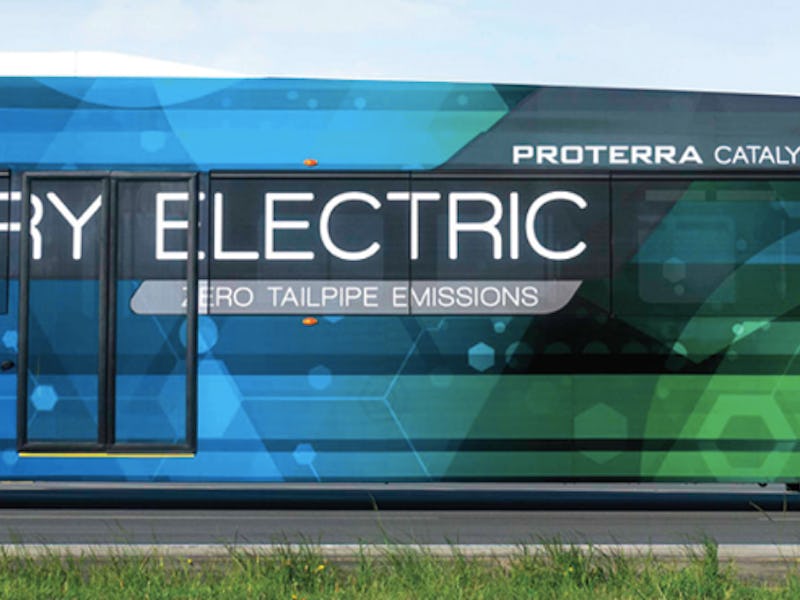The "Tesla of Buses" Just Set a New Record in Electric Transport
The race for the best long-range electric vehicle is on.

An electric bus has driven a record-breaking 1,102 miles on one charge, shattering the old mark for battery longevity. While the drive happened early this month in an Indiana test site, that distance would have been enough to drive all the way from New York City to Orlando, Florida.
“What we are bringing to this program will be the future of public transportation,” Seneca Schepmann, a senior project engineer at Proterra, the California-based electric bus company responsible for this feat, said in a promotional video.
The previous record was held by a teeny electric car created by researchers in Germany. Traveling the distance that car did is an impressive feat for any electric vehicle, let alone for a bus like the Catalyst E2, which is a massive 40 feet in length.
That said, it would have taken a ridiculously long time to make it down the Atlantic seaboard in the Catalyst, as it was traveling at an average speed of just 15 miles per hour. This strategy, in which other factors like speed and stoppages are ignored in favor of getting the maximum mileage is called hypermiling.
In addition to developing the Catalyst, Proterra has previously come up with a patent-free electric car charging system that works as quickly as a diesel refuel. The company has received millions of dollars in funding from the California Energy Commission for its work.
The Catalyst’s record precedes Elon Musk’s Tesla semi, which will be unveiled late next month. While there’s much excitement surrounding the future of larger electric-powered vehicles, there’s also been plenty of doubt cast on their ability to convince drivers to make the switch.
For instance, the Tesla Semi is only expected to have a range between 200 and 300 miles before another charge is required. This pales in comparison to the 1,000 miles diesel trucks can travel on a single tank — or, for that matter, the 1,100 miles the Catalyst E2 now claims.
While Proterra’s recent feat is certainly impressive, it likely won’t serve as direct competition to Musk. Earlier this summer, Musk walked back on his previous mentions of an electric bus alternative. Instead, Musk envisions a future where people get in and out of whatever autonomous vehicle is closest at hand.
“I don’t know if the bus thing really makes sense in the shared fully autonomous environment,” he said on an investor call in May. “If it costs less than a bus ticket to make use of a shared autonomy fleet to go wherever you want, point to point, well why don’t you just use that? So I don’t know.”
What ultimately stands between the Catalyst or any future heavy-duty electric vehicle and total disruption of the automotive industry is cost. The Proterra bus costs $750,000 compared to the $500,000 cost of a typical diesel bus, according to Fortune. Researchers at Columbia University have put the annual savings of electric buses at $39,000 per year on a 12-year lifetime, meaning that the difference is more than made up for over time. But still, it’s a lot of cash up front.
If you liked this article, check out this video of a Tesla Model X predicting a car accident before it even happened.